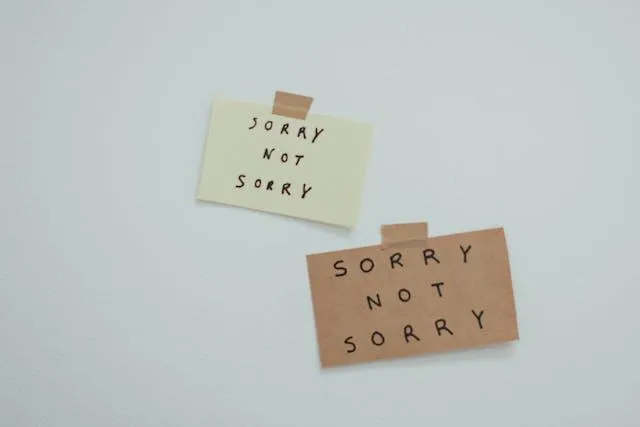
Couples struggle to make meaningful apologies.
Image: Pexels/ Yankrukoz
Apologies are simple but powerful ways to repair relationships and build connections.
Still, with “sorry” often said too much, too little, or in the wrong way, many of us don’t fully grasp what makes an apology meaningful.
From a quick “sorry” to avoid trouble to a celebrity’s public statement, learning how to apologise well is a valuable skill.
A sincere apology is more than just words; it is an act of emotional courage and maturity that rebuilds trust and validates another’s experience. Yet, understanding what sets a genuine apology apart is crucial, especially when apologising can feel difficult or uncomfortable.
Independent Media Lifestyle consulted clinical psychologist Chris Kemp to unpack the psychology and nuance of apologising, exploring what makes a genuine apology effective, why timing matters, and how apologies shape relationships, both personal and professional.
“Apologising is fundamentally about connection,” says Kemp. “It’s a way of acknowledging that someone else’s experience matters to you. Even if you can’t undo the harm, the act of recognising it can go a long way toward emotional healing.”
For the giver, an apology is often motivated by guilt, remorse, or a desire to repair a fractured relationship. For the receiver, it validates their feelings and provides the acknowledgement they may need to move forward. Without that acknowledgement, resentment and disconnection can fester.
Studies show that a well-delivered apology can rebuild trust, alleviate emotional pain, and even improve mental health for both parties.
According to research published in the Journal of Social and Clinical Psychology, sincere apologies activate empathy in the receiver and reduce feelings of anger or betrayal.

Apologies may not undo the past, but they have the power to heal, rebuild, and reconnect. A sincere “I’m sorry” isn’t just about making amends, it’s about making relationships stronger.
Image: Cup of Couple/Pexel
The anatomy of a meaningful apology
Not all apologies are created equal. An insincere or defensive apology (“I’m sorry you feel that way”) can do more harm than good. A meaningful apology, Kemp explains, has four key components:
An important aspect of a good apology is sincerity. “We’ve all been on the receiving end of a half-hearted ‘sorry,’ and it never feels satisfying,” Kemp notes. A genuine apology requires emotional vulnerability. It’s not about ticking a box; it’s about truly meaning what you say.”
Timing also plays a crucial role. Apologising when emotions are still raw can backfire. “Sometimes, people need space to process their feelings before they’re ready to hear an apology,” Kemp advises.
“Rushing it can make the apology feel more about easing your guilt than addressing their pain.”
Apologies aren’t one-size-fits-all. Cultural, gender, and generational differences can shape how apologies are given and received.
In some cultures, apologising may be seen as a sign of humility and strength, while in others, it might be viewed as a loss of face. Gender dynamics also play a role: studies suggest women are more likely to apologise than men, often because they’re socialised to maintain harmony.
Social media adds another layer of complexity. Text-based apologies can feel impersonal and insincere, lacking the emotional nuance of face-to-face interaction. “We lose tone, body language, and eye contact,” Kemp explains. “Without these cues, it’s easy for an apology to come across as hollow or performative.”
The public apology era: celebrities, brands, and politicians
In the age of viral outrage, public apologies have become a spectacle. From celebrities to corporations, public figures are often scrutinised for how and whether they apologise.
“Public apologies tend to fail because they lack sincerity,” says Kemp. “They’re often written by a PR team, and the public can sense when an apology isn’t genuine.”
For instance, when a brand apologises while simultaneously justifying its actions, it can come across as defensive and self-serving. “The moment you start making excuses, the apology loses its power,” Kemp warns.
Public apologies also face the challenge of audience bias. “If people already dislike a politician or brand, their apology is less likely to be received positively,” Kemp explains. “We view them through the lens of our pre-existing opinions.”

In the workplace, apologising can feel like walking a tightrope. No one wants to appear incompetent or weak, but a lack of accountability can damage trust and team dynamics.
Image: Yan Krukau /Pexels
Apologising at work
In the workplace, apologising can feel like walking a tightrope. No one wants to appear incompetent or weak, but a lack of accountability can damage trust and team dynamics.
“A professional apology doesn’t need to be overly complicated,” Kemp advises. “It’s about acknowledging your mistake, taking responsibility, and showing a commitment to improvement.”
For example: “I made a mistake on this project, and I’m sorry for the extra stress it caused. I’ll take steps to ensure it doesn’t happen again.” Simple, honest, and effective.
Avoid excuses or shifting blame. “When you start deflecting, people lose respect,” Kemp warns. “Taking ownership shows maturity and builds credibility as a leader.”
Why do we struggle to say sorry
If apologising is so powerful, why is it so hard? For many, saying “sorry” triggers feelings of vulnerability or fear of rejection. Others may struggle with pride or feel that apologising diminishes their authority.
Kemp suggests reframing apologies as a strength rather than a weakness. “Apologising isn’t about admitting defeat; it’s about showing integrity and emotional intelligence. It’s a way of saying, ‘I value this relationship more than my ego.’”
While apologies cannot change the past, their real power lies in helping to heal, rebuild trust, and foster stronger connections. A sincere “I’m sorry” strengthens relationships by showing respect, understanding, and genuine commitment to improvement.